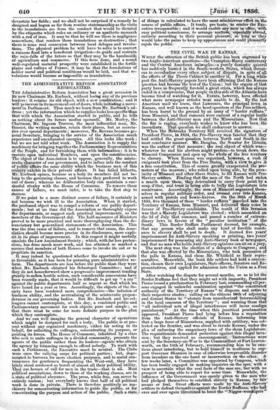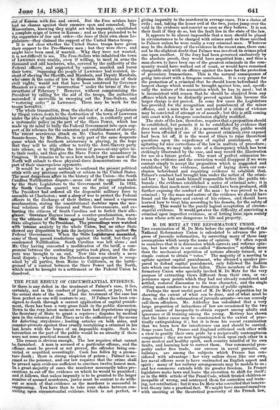THE . CIVIL WAR IN KANSAS.
WHILE the attention of the British public has been engrossed by two Anglo-American questions—the Crampton-Marcy ,controversy and the Central American imbroglio—a purely domestic quarrel has suddenly loomed in the South-western States, which threat- ens to overshadow every 'ether. subject of dispute, in spite of all the efforts of the Pierce Cabinet to smother it For a long while past the Anti.4flavery papers have been affirming that the Kansas question had become the test of the Union ; but the organs of that party have so frequently foretold a great crisis,, which has alwayti ended in a compromise, that people on this side of the Atlantic have become tired of watching for it. Events, however, have effected what mere newspaper articles were unable to do. B. the last American mail we learn, that Lawrence, the princi town in
th
Kansas, and well known as the head-quarters of the r rs
ee settler& has been burnt to the ground by an army of "border ruffians" from Missouri and that rumours were current of a regular battle between the Anti Slaverymen and the Missourian& Now that the fire is raging, everybody_wishes to know who has been the incendiary. That question we shall endeavour to answer.
When the Nebraska Territory Bill received the signature of President Pierce, in 1854, the Pro-Slavery ram fancied that their had settled the great question between North and South in the moat conclusive manner. Mr. Douglas, the Senator for Illinois; was the author of that measure ; the real object of which was— whatever he and his abettors might profess—to break down the Missouri Compromise and open up the whole of the free territory- to slavery. When Kansas was organized, however, a rush of emigrants took place from the Free States, with a view to give it a free constitution. This of course greatly exasperated the pro- moters of the measure - who relied upon being able, by the prox- imity of Missouri and Other Slave States, to fill Kansas with Pro- Slavery settlers. Finding that the men of the North had stolen a- march upon them, they determined to carry their point by a eoup.d'etat, and trust to being able to bully the Legislature into connivance. Accordingly, the men of Missouri organized them,- selves in regular military order and crossed over into Kirntsst armed with pistols and bowie-knives. On the 30th of 1855, five thousand of these " border ruffians" marched into the Territory. of Kansas, from Missouri, and delivered their votes in favour of Pro-Slavery candidates. The result of this invasion was that a Slavery Legislature was elected ; which assembled on the 2d of July i that summer, and passed a number of extraor- dinary laws n favour of the " peculiar institution " of the South. This Border Ruffian Parliament decreed, for example, that any person who shall make any kind of forcible resist- ance to slavery shall be put to death. It decreed five years' imprisonment for Anti-Slavery speaking or printing, two years' imprisonment for possessing any Anti-Slavery book or newspaper, and that no man who holds Anti-Slavery opinions can sit on a jury. The next step was the election of a delegate to Congress ; and that also was effected by the Missourians who took possession of the polls in Kansaa, and chose Mr. -Whitfield as their repre- sentative. Meanwhile, the bona Me settlers had held a conven- tion, chosen their own Legislature, State officers, Senators and Re- presentatives, and applied for admission into the Union as a Free. State.
After watching the dispute for several months, so as to let the Ruffians feel that they might act with impunity, President Pierce issued a proclamation in February last, commanding all per- sons engaged in unlawful combination agamst " the constituted authority of the Territory of Kansas" to disperse and retire to their respective abodes ; calling on the citizens litth of adjoining and distant States to " abstain from unauthorized intermeddling in the local concerns of the Territory " ; and warning them that " all individual acts of illegal interference will incur condign punishment." At the time when this jesuitical proclamation appeared, President Pierce had lying before him a requisition from the Anti-Slavery officials of Kansas, informing him that a large force of Missourians, supplied with artillery, was col- lected on the frontier, and was about to invade Kansas, under the plea of enforcing the sanguinary laws of the sham Legislature. The requisitionists demanded protection against this illegal inva- sion ; but they received no encouragement. Instructions were sent by the Secretary-at-War to the Commandant at Fort Leaven- worth, on the 15th of February, recommending him to be cau- tious about interfering, but to hold himself in readiness to sup- port Governor Shannon in case of otherwise irrepressible disorder from invaders on the one hand or insurrection on the other. A few weeks later; a Committee was appointed by Congress, which has been busily engaged in making inquiries on the spot, with a view to ascertain what the real facts of the ease are, but' with no prospect of being able to report for some time. Meanwhile, the influence of the Government was openly given to the men who had pledged themselves to establish slavery in Kansas, by fair means or foul. Great efforts were made by the Anti-Slavery' settlers to defend themselves against the Border Ruffians, who had over and over again threatened to hunt the "Nigger-worshipers" out of rinias with and sword. But the Free settlers have had no chance against their enemies open and concealed. The Missourians, -knowing they might act with impunity, established a complete reign of terror in Kansas ; and as they pretended to be the supporters of law and order--the laws of their own sham Le- gislature-7they claimed the support of the United States troops. It is not clear whether the United States troops have given their support to the Pro-Slavery men but they were there, and might have been., used; if .wanted..: Why they were not wanted, it is not difficult-4i see. The Fiee-Soilers who inhabited the town
unable, even if willing, to meet in arms the thousand and Odd borderers, who, covered by the authority of the Federal officer4 :and supported 'by cannon, assailed and burnt their town. Stippesing the people of Lawrence had'resisted,
obeyingstedof the Sheriffs, and Marshals, and Deputy Marshalis, winircialie in the name of law. to dispossess the oitizens of their d' `rights, would not that luive been construed by Governor
annon as a cage of " insurrection " under the terms of the in- structions of February ? However, without compromising the President by calling for the aid of the troops, 'the authorities succeeded" a meiveille in Sweeping out the Free4Soilers, and " restoring order " in Lawrenee. There may be work for the troops hereafter.
The whole transaction, from the election'of a sham Legislature by illegal voters. down to the destruction of the town of Lawrence Under maintaining law and order, is evidently part of a systematic policy On the part of the Slave Powe,r, which has 'node up its mind to bully the Federal Government into open sup- port of its Schemes for the extension and establishment of slaVery. Theligdiit murderous attack on Mr. Charles Sumner, in the Senate-house, by Mr. Brooks, is only part of the same desperate ggaamme which the Southern aristocracy is playing., in the hope that they will be able either to terrify the. Anti-Slavery party into silence, or to -frighten the lovers of peace-at-any-price in- to their ranks, and thus give the Slave Povier the ascendancy in Congress. It remains to be seen how much longer: the men of the North will submit to these physical-force demonstrations on the part of their unscrupulous opponents. It would be a great mistake to confound the present political crisis with any previous outbreak or schism in the United States. The most dangerous affair in the history of the Union—the South Carolina Nullification dispute—anse out of the opposition made by the State Legislature to the Government tariff In 1832, the South Carolina quarrel was on the point of explosion. The President had ordered all the disposable military force to assemble at Charleston; rant a sloop of war to protect the Federal officers in the discharge of their duties ; and issued a vigorous Proclamation, stating the constitutional doctrine upon the Imu- teal relations of the General and State Governments, and ex- horting the citizens of South Carolina not • to forfeit their alle- giance. Governor Haynes issued a counter-proclamation, warn- ing the citizens of the State against being seduced from their State allegiance by the President. The proceedings Were watched with intense anxiety by the whole Union, but no other State Showed any disposition to join the incipient rebellion against the Federal Government. When the State Legislatures assembled, some of them passed resolutions against the tariff, but they all condemned Nullification. South Carolina was left alone ; and Mr. Clay having concocted a modification of the tariff, a com- promise between the contending parties took place, and the dis- pute was brought to an end. Now this was clearly. a mere local diipute ; whereas the Nebraska-Kansas question is recog- nized by all parties, from Maine to California, as the battle- ground of a -contest between the Slave Power and the North, Which'mnst be brought to a settleinent or the Federal Union be dissolved.



























 Previous page
Previous page